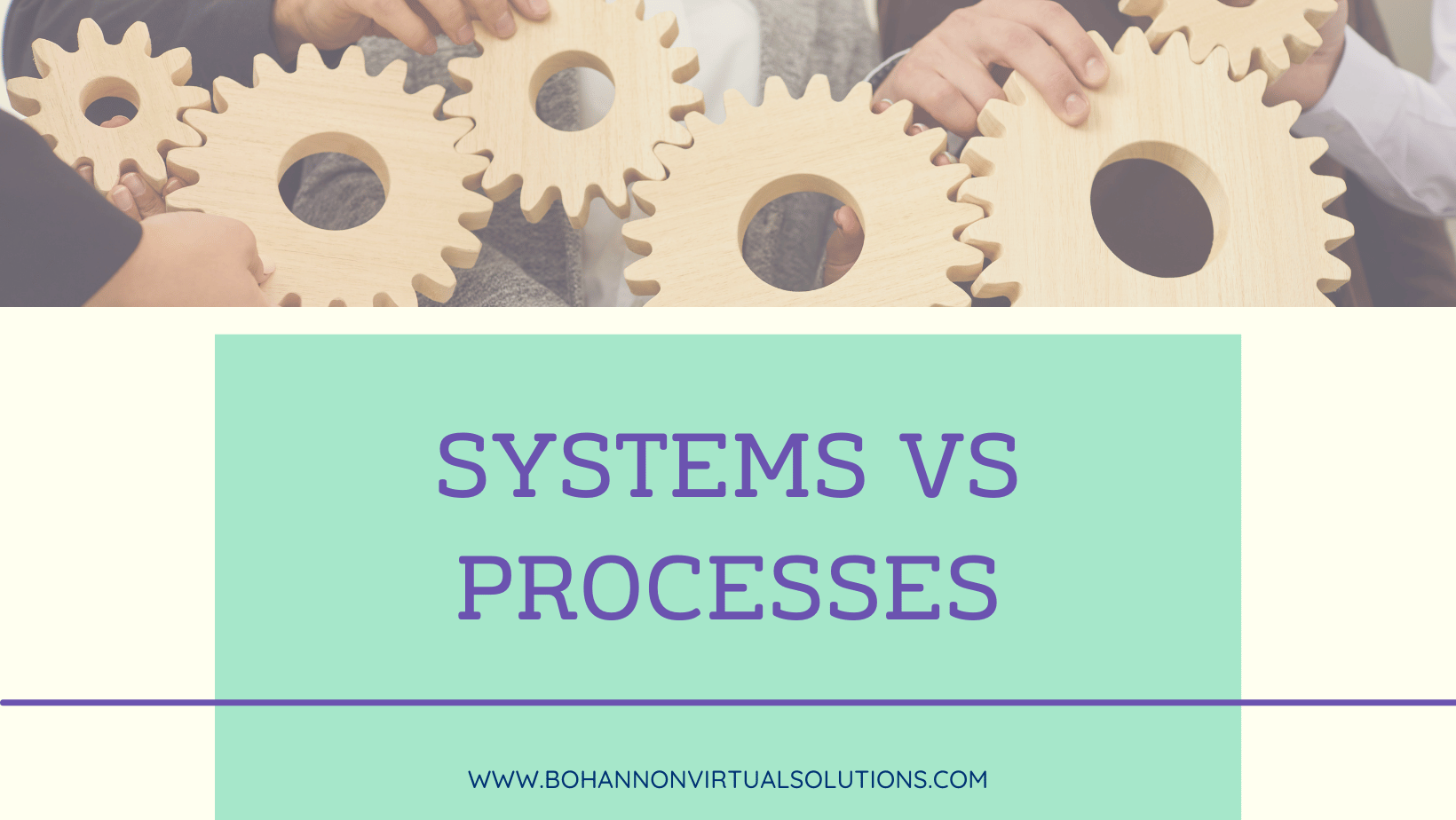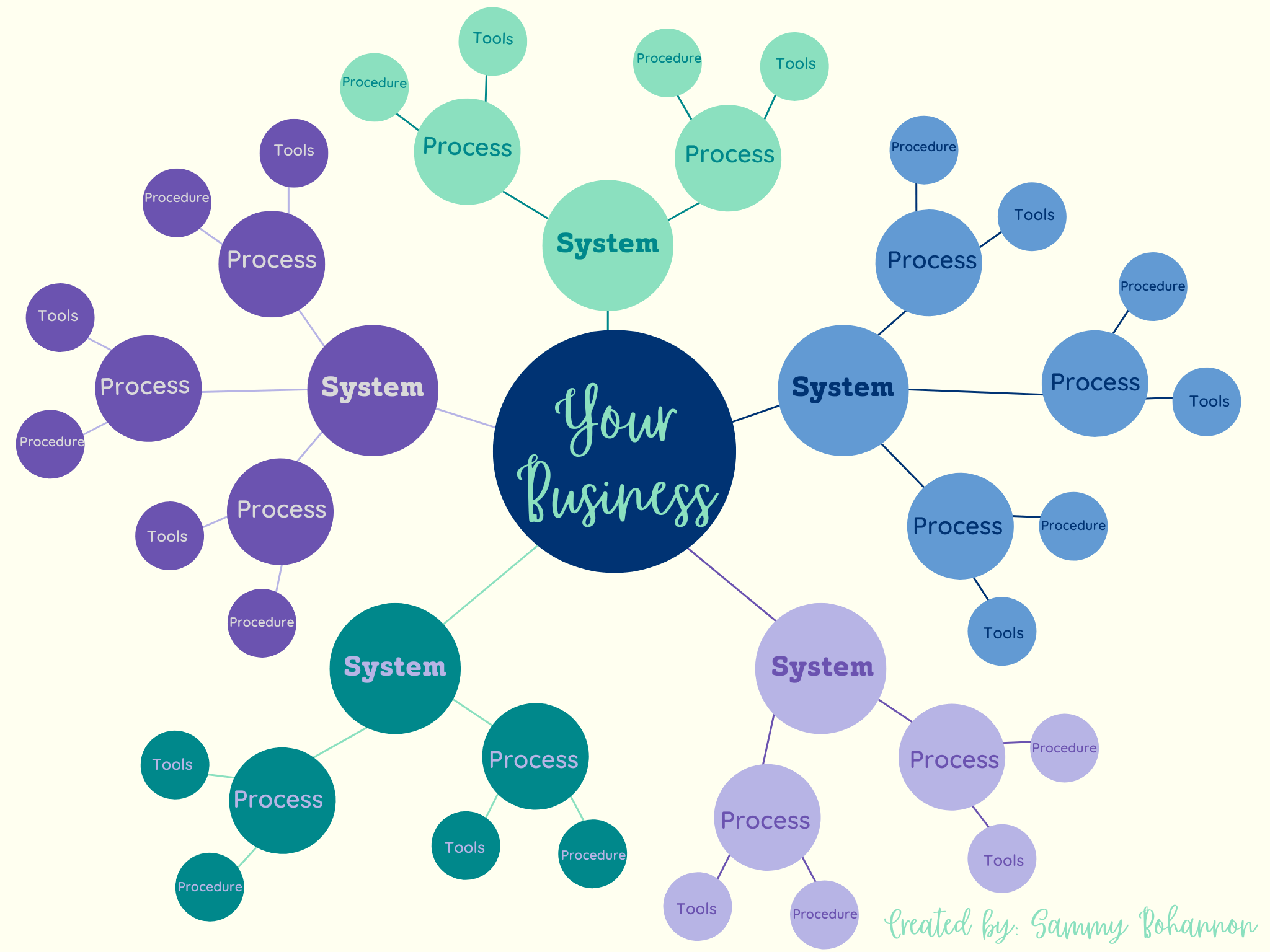Systems and Processes: What’s the Difference?
Your business is likely guided by your systems and processes without you even realizing it.
I find that by the time business owners come to me, they have many of their systems and processes in place, they just aren’t well documented or need a little polishing; they usually aren’t missing completely.
Systems and Processes in Business
Systems and processes are the bare bones of your business. They ensure your business runs smoothly, everyone knows what to do and when to do it, tasks get completed correctly, and everything stays organized. Thus, your business systems and processes determine how your business is run and how efficient it is. This is true whether you’re a solo business or a team of 20+.
Are Systems and Processes the Same?
Short answer, no. They are not.
They are, however, often used interchangeably online and in the business realm in conversations and spaces where specificity is not necessary. For all intents and purposes, it’s generally okay in most contexts to use the two terms as one, but when you’re really getting into the ins and outs of your business, you do want to use the correct term and be specific with what you mean when you use these terms to talk about your business and talk to members of your team or contractors you have hired.
Why Are They Used Synonymously?
Most people running small businesses (myself included) are self-taught and do not have MBAs. So chances are a lot of people do not know the difference between a system and a process (this is actually what I’ve run into quite a bit with my own encounters). Likewise, it’s sometimes just easier to call them the same thing, because they are related, if it doesn’t make a huge difference for whomever you’re talking to to know the difference.
But since there is a difference, and that’s what you’re here to learn today, let me define them both for you.
What Are Business Systems?
I could spend a long time talking about business systems (in fact, I have at least two other blog posts about this). For the sake of this post, I’m going to give an overview of systems in business to keep things simple. If you’d like a more detailed explanation, I recommend you read this post.
Business systems are the big picture pieces of your business that keep it running. These are the major areas of your business that can be clumped into groups that go together.
Think of systems as the departments of your business. While each system (department) is different, it does compliment other systems (departments) to make up your whole business.
Business systems are made up of one or more processes.
Examples of Systems for Small Business
Some systems (and subsystems) in your business may include:
Sales System
Marketing System
Email Marketing System
Social Media Marketing System
Client Management System
Client Onboarding System
Client Relationship Management System
Client Offboarding System
File Organization System
Note: This list is neither extensive nor all inclusive.
What Are Business Processes?
Processes make up systems. They are the series of steps or actions that are taken to achieve a specific outcome. Processes are organized step-by-step and can be followed by whomever is completing a task or activity.
Processes are comprised of procedures and the tools needed to carry out the process.
Examples of Processes for Small Business
You have a number of processes for your business. Some of them may include:
Hiring new team members
Updating old blog posts
Creating social media posts
Following up with old leads
Creating a new client contract
Closing out a client account
Note: This list is neither extensive nor all inclusive.
Systems and Processes are Connected
In case you are a visual learner, here is a visual representation of your business. There can be more, or less, systems and/or processes. This is just a basic graphic to help you visualize how systems and processes are related.
While not the same, business systems and processes are interconnected. As you can see in the image above, systems are a group of processes.
Without processes, you have no systems. Each process in a system contributes to the overall function of the system. If one process fails, it can affect the entire system: throwing everything, and everyone, off.
Furthermore, the job of the system is to ensure that each process is working together with the other process(es) to create a cohesive, harmonious system.
The interconnectivity of your systems and processes are essential for your business’s efficiency and effectiveness.
How to Differentiate Between Systems and Processes in Business
Before we go into the how, let’s start with the why:
It is important to differentiate between systems and processes when you are looking at your business as a whole, auditing your business, identifying areas for improvement, and working on getting specific about what is or isn’t working for you and your business.
At first, it might seem frustrating to think about if a component of your business is a system or process. I want to encourage you to take a few minutes and really define each piece and part of your business and its role in your business as a whole.
In general, here’s how you know.
It’s a Business System if:
Its life cycle is cyclical rather than linear.
It is made up of multiple components that depend on each other for it to achieve it’s purpose.
There isn’t a required order for it to be successful.
It’s more general rather than highly specific.
It’s a Business Process if:
It has a clear beginning and end.
Steps are sequential; each new step is dependent upon the last.
It’s highly specific and helps you complete tasks.
Why Your Business Needs Both Systems and Processes
As we’ve already discussed, your business needs both systems and processes to fully function, be efficient, and remain effective. Your systems and processes work very closely together to form your entire business.
Having strong systems and processes ensures that your business is set up for success. It means that you know what to do and when and why.
Furthermore, effective systems and processes lead to better team experience, better customer experience, and better satisfaction from all involved.
What Happens if You Don’t Have Systems and Processes in Business?
To be frank, if you don’t have systems and processes in your business, you’re headed down a rocky path. Tasks are unclear, team members don’t know what to do or when, and they often don’t know who to reach out to. This is a fast track for confusion, mistakes, and burnout.
Without systems and processes, your productivity is likely to slow, your team is likely to be dissatisfied, and your customers will be frustrated and may even leave. Next think you know, you’re wondering if your business can even stay afloat and unsure where everything went wrong.
Ultimately, a business without systems and processes cannot scale beyond you. You cannot adapt or change a business that doesn’t have solid foundations in place and cannot last long-term.
Final Thoughts
While I truly believe there is no right or wrong way to organize your systems and processes, and that systems and processes are deeply personal for each business, I know and believe that all businesses need some systems and processes to succeed long-term.
If you’d like more information about systems and processes, each week in my newsletter, Business & Balance, I share at least one system you can work on each week. I include information about what they system is and how you can create it, why you need it, and/or how to make your existing system stronger.
To join the newsletter, Business & Balance, enter your first name and email below:






Many of my blog posts lately have played with ideas of what many people know and believe virtual assistants and online business managers to be. I see so many small business owners try to use a VA or an OBM for all things in their business without having any actual strategy or having consulted someone whose specialty is in the area they are needing help with. These range from bookkeeping (needs a bookkeeper), to branding (needs a brand strategist), to financial operations (needs a financial ops manager), and even marketing (needs a marketing director). ..